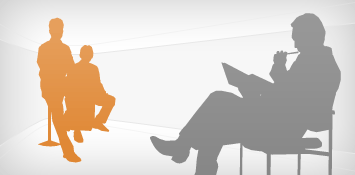
The office (r)evolution
Flexible working – methods and new tools mean we’re now heading towards the third – generation office. This is no longer just a question of choosing your own room or an open – plan office, it’s about how we use our workspace.
In a typical office environment, people spend an average of about 50% of their working-hours at their desks. The rest consists of meetings, conferences, travel, etc. Generally, office work is heading towards a more flexible, project-based approach, which obviously will affect the way we use our workspace. In certain periods, we need to sit close to other members of project teams, or have access to conference rooms and premises. But at other times, we could be working a lot from home, or in another location. In between, we can be fairly stationary until our next project gets underway.
Nowadays, we can choose between an array of workspaces: our office, home, with customers, in town, public conference facilities and others. This sets high standards for the interaction between premises, technology and working methods.
UK telecom group BT (British Telecom) has been running one of Europe's largest projects in flexible working methods and offices since 2005, involving 70,000 BT employees. There have been a lot of pay-offs. BT indicates that more flexibility provides a better work-life balance, reduces climate effects, cuts costs and sharpens employees' customer focus.
There are also enormous savings to be had in reduced costs of offices and premises, and greater employee effectiveness. British Telecom's research demonstrates that people with flexible working hours are 20% more efficient than their colleagues with fixed office bases.
Another clear benefit is that flexible working is often more project based. Putting together multidisciplinary project teams quickly to solve a customer's problem is easier. This philosophy also serves as the foundation for the whole project-building success on the capacity to predict and react to change in an economy controlled by digital networks.
On the environmental side, this project has generated a reduced environmental impact from fewer workspaces and saved an estimated 12 million litres of fuel each year from reduced commuting. Teleconferencing has eliminated 300,000 physical meetings, generating savings of over EUR 38 million yearly and 1.5 million return journeys.
Contemporary workspaces are based on contemporary working methods. Flexible working methods require employees to take responsibility for their tasks and working-hours. BT directs its employees towards goals instead of timing how long they're at their desks. One previously feared risk was the loss of a distinction between work and leisure creating stress-related problems. But on the contrary, employees determining when and where they work themselves results in better health. This responsibility, which often simplifies how people put their lives together and gives them more control over their time, reduces stress, even at work.
If you've got any questions or want to find out more:
Contact Helena Gustafsson.
tel: +46 (0)8 553 95287, helena.gustafsson@coor.com
